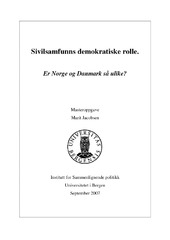Sivilsamfunns demokratiske rolle. Er Norge og Danmark så ulike?
Master thesis
Permanent lenke
https://hdl.handle.net/1956/2467Utgivelsesdato
2007Metadata
Vis full innførselSamlinger
Sammendrag
The starting point of this paper is the reports on power and democracy which were finished in Denmark and Norway in 2003. The paper is an attempt at explaining the reason for the great differences between the conclusions of the two reports when it comes to the democratic role of civil society in the two countries. While the Danish report claims that the Danish democracy is ”still viable”, the Norwegians claim that the Norwegian democracy is “disintegrating”. The differences are interesting since Denmark and Norway both have political systems which, according to the literature of the field, and compared to other democracies, are very similar.By means of comparative analyses of Denmark and Norway, the paper reveals differences between the two reports both when it comes to definitions and interpretations in addition to differences between the two countries concerning the development of civil society, the structure in the variety of organizations and individual approaches to political commitment, participation and trust. The investigations show that the difference in definitions for democracy and political participation probably has had the greatest effect on the conclusions of the two reports, since the Norwegian reports clearly have tougher criteria as to what constitutes meaningful democratic participation.The groups of variables that constitute the foundation of the analyses are definitions and interpretations used in the reports, historical development, where the focus is on the creation of civil society and the development in both countries, the structural relationships in the variety of organizations in both Denmark and Norway, and political commitment, participation and trust among the people. The starting point for the analyses has been classical theories of democracy and civil society, but the investigations are also connected to other schools of thought within theories of democracy. The analysis of the variables are based on suitable literature, in addition to secondary data and statistics.
Utgiver
The University of BergenOpphavsrett
The authorCopyright the author. All rights reserved
